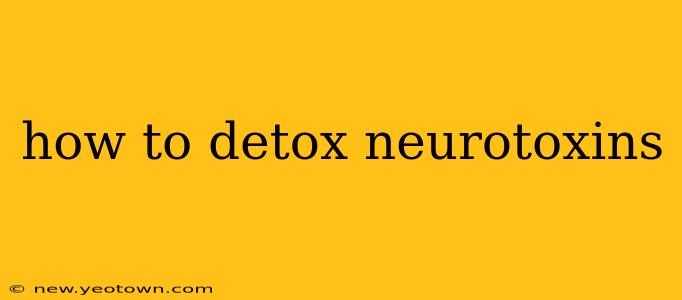Our modern world bombards us with neurotoxins – harmful substances that can wreak havoc on our nervous systems. From pesticides in our food to heavy metals in our water, these insidious compounds can contribute to a range of health problems, from brain fog and fatigue to more serious neurological conditions. But the good news is, there are ways to support your body's natural detoxification processes and lessen their impact. This isn't about a quick fix; it's about adopting a holistic lifestyle that prioritizes your brain health. Let's explore how you can effectively detox neurotoxins.
What are Neurotoxins?
Before diving into detoxification, let's clarify what neurotoxins are. These are substances that damage or impair the function of the nervous system. This encompasses a broad range of compounds, including:
- Heavy metals: Mercury, lead, cadmium, and aluminum.
- Pesticides: Organophosphates, organochlorines, and neonicotinoids.
- Industrial chemicals: PCBs, phthalates, and BPA.
- Mold toxins: Mycotoxins produced by various mold species.
- Excitotoxins: Substances that overstimulate nerve cells, such as glutamate (in excess).
How Do Neurotoxins Affect the Body?
Neurotoxins work in different ways, but the common thread is disruption to the delicate balance of the nervous system. Some interfere with nerve signal transmission, while others damage nerve cells directly. This can manifest in various symptoms, depending on the toxin and the level of exposure:
- Cognitive impairment: Brain fog, difficulty concentrating, memory problems.
- Mood disturbances: Anxiety, depression, irritability.
- Sleep problems: Insomnia, restless sleep.
- Fatigue: Persistent tiredness and lack of energy.
- Headaches and migraines: Severe and recurring headaches.
- Neurological disorders: In severe cases, chronic exposure can contribute to more serious conditions.
What are the Best Ways to Detox Neurotoxins?
There's no single magic bullet for neurotoxin detoxification. Instead, a multifaceted approach is crucial. It's about supporting your body's inherent detoxification mechanisms while minimizing further exposure.
1. Reduce Exposure to Neurotoxins: The Foundation of Detox
This is the most critical step. Before you worry about removing toxins already in your body, focus on preventing further exposure.
- Eat organic produce: Conventional produce often contains pesticide residues. Choose organic whenever possible, particularly for the "dirty dozen" fruits and vegetables.
- Filter your water: Many water sources contain heavy metals and other contaminants. Invest in a high-quality water filter.
- Choose natural cleaning products: Conventional cleaning products often contain harsh chemicals that can be inhaled or absorbed through the skin.
- Avoid processed foods: Processed foods are often packed with artificial ingredients and preservatives, some of which are neurotoxic.
- Limit exposure to air pollution: Live in a well-ventilated space and avoid areas with high levels of air pollution.
2. Support Your Body's Natural Detoxification Systems
Your liver and kidneys are your body's primary detox organs. Supporting their function is vital.
- Hydration: Drink plenty of pure, filtered water to help flush out toxins.
- Fiber-rich diet: Fiber aids in the elimination of toxins through the digestive system.
- Liver-supporting foods: Cruciferous vegetables (broccoli, cauliflower), beets, and garlic support liver function.
3. Consider Specific Detoxification Strategies
While some strategies are better supported by research than others, several methods are often recommended. Always consult with a healthcare professional before starting any new detoxification program, especially if you have pre-existing health conditions.
- Chelation therapy: This medical procedure uses medications to remove heavy metals from the body. It's usually only recommended for individuals with high levels of heavy metal toxicity, diagnosed through blood tests.
- Sauna therapy: While not directly removing neurotoxins, sweating can help eliminate some toxins through the skin. However, its effectiveness regarding neurotoxins is still under research.
4. Lifestyle Choices for Neurotoxin Detox
Beyond specific strategies, certain lifestyle choices significantly support detoxification:
- Prioritize sleep: Adequate sleep is crucial for the body's repair and detoxification processes.
- Manage stress: Chronic stress can hinder detoxification. Practice stress-reducing techniques like yoga, meditation, or deep breathing.
- Regular exercise: Exercise promotes circulation and lymphatic drainage, supporting the removal of toxins.
Frequently Asked Questions (FAQs)
How long does it take to detox from neurotoxins?
The time it takes varies significantly depending on factors like the type and amount of toxins, individual metabolism, and the chosen detoxification methods. It's not a quick fix; it's an ongoing process.
What are the symptoms of neurotoxin poisoning?
Symptoms can vary widely, ranging from mild cognitive issues (brain fog, fatigue) to more severe neurological problems. If you suspect neurotoxin poisoning, consult a healthcare professional immediately.
Can you detox neurotoxins naturally?
While medical interventions like chelation therapy exist, many natural approaches can support detoxification, such as dietary changes, hydration, and lifestyle modifications. However, natural methods are best considered as supportive measures, not primary treatments for significant toxicity.
Are there any specific foods that help detox neurotoxins?
Foods rich in antioxidants, fiber, and those supporting liver function (e.g., cruciferous vegetables, beets, garlic) are often recommended.
What are the risks of detoxing neurotoxins?
Improper detoxification methods can sometimes have adverse effects. It's essential to work with a healthcare professional, especially for medical interventions like chelation therapy. Always prioritize safety and informed choices.
By integrating these strategies into your life, you can significantly reduce your body's burden of neurotoxins and promote optimal brain health. Remember, this is a journey, not a race. Small, consistent changes can make a big difference in the long run. Always consult with a healthcare professional before making significant dietary or lifestyle changes, especially if you have any underlying health concerns.

